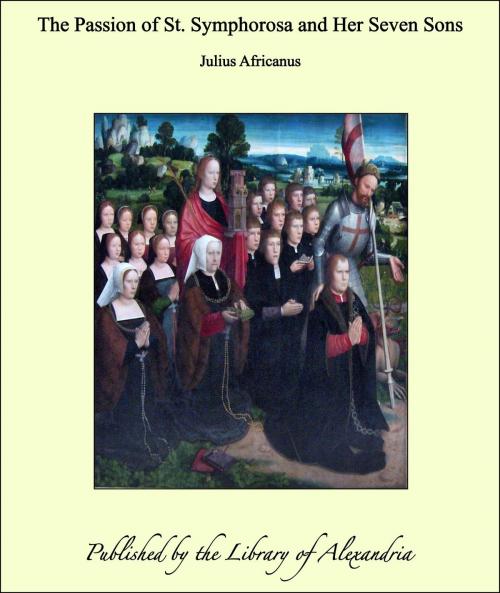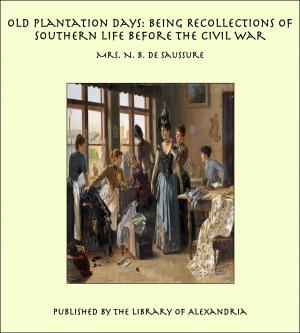The Passion of St. Symphorosa and Her Seven Sons
Nonfiction, Religion & Spirituality, New Age, History, Fiction & Literature| Author: | Julius Africanus | ISBN: | 9781465555434 |
| Publisher: | Library of Alexandria | Publication: | March 8, 2015 |
| Imprint: | Language: | English |
| Author: | Julius Africanus |
| ISBN: | 9781465555434 |
| Publisher: | Library of Alexandria |
| Publication: | March 8, 2015 |
| Imprint: | |
| Language: | English |
and one in the library of the Sorbonne. The occasion for the death of these saints was found in the vicinity of that most famous palace which was built by Adrian at his country seat at Tiber, according to Spartianus. For when the emperor gave orders that this palace, which he had built for his pleasure, should be purified by some piacular ceremonies, the priests seized this opportunity for accusing Symphorosa, alleging that the gods would not be satisfied until Symphorosa should either sacrifice to them or be herself sacrificed; which last thing was done by Hadrian, whom, from many others of his deeds, we know to have been exceedingly superstitious, about the year of Christ 120, that is, about the beginning of his reign, at which period indeed, as Dio Cassius observes, that emperor put a great number to death. The memory of these martyrs, moreover, is celebrated in all the most ancient martyrologies, although they assign different days for it. The Roman, along with Notker, fixes their festival for the 18th July, Rabanus for the 21st of the same month, Usuardus and Ado for the 21st June. In the Tiburtine road there still exists the rubbish of an old church, as Aringhi states (Ram. Subter., iv. 17), which was consecrated to God under their name, and which still retains the title, To the Seven brothers. I have no doubt that it was built in that place to which the pontiffs in the Acta, sec. iv., gave the name, To the Seven Biothanati, i.e., those cut off by a violent death, as Baronius remarks, at the year 138.” So far Ruinart: see also ‘Tillemont, Mem. Eccles., ii. pp. 241 and 595; and the Bollandists, Act. S.S. Funii, vol. iv. p. 350. I. When Adrian had built a palace, and wished to dedicate it by that wicked ceremonial, and began to seek responses by sacrifices to idols, and to the demons that dwell in idols, they replied,(2) and said: “The widow Symphorosa, with her seven sons, wounds us day by day in invoking her God. If she therefore, together with her sons, shall offer sacrifice, we promise to make good all that you ask.” Then Adrian ordered her to be seized, along with her sons, and advised them in courteous terms to consent to consent to offer sacrifice to the idols. To him, however, the blessed Symphorosa answered: “My husband Getulius,(3) together with his brother Amantius, when they were tribunes in thy service, suffered different punishments for the name of Christ, rather than consent to sacrifice to idols. and, like good athletes, they overcame thy demons in death. For, rather than be prevailed on, they chose to be beheaded, and suffered death: which death, being endured for the name of Christ, gained them temporal ignominy indeed among men of this earth, but everlasting honour and glory among the angels; and moving now among them, and exhibiting(1) trophies of their sufferings, they enjoy eternal life with the King eternal in the heavens.” 2. The Emperor Adrian said to the holy Symphorosa: “Either sacrifice thou along with thy sons to the omnipotent gods, or else I shall cause thee to be sacrificed thyself, together with thy sons.” The blessed Symphorosa answered: “And whence is this great good to me, that I should be deemed worthy along with my sons to be offered as an oblation to God?”(2) The Emperor Adrian said: “I shall cause thee to be sacrificed to my gods.” The blessed Symphorosa replied: “Thy gods cannot take me in sacrifice; but if I am burned for the name of Christ, my God, I shall rather consume those demons of thine.” The Emperor Adrian said: “Choose thou one of these alternatives: either sacrifice to my gods, or perish by an evil death.” The blessed Symphorosa replied: “Thou thinkest that my mind can be altered by some kind of terror; whereas I long to rest with my husband Getulius,(3) whom thou didst put to death for Christ’s name.” Then the Emperor Adrian ordered her to be led away to the temple of Hercules, and there first to be beaten with blows on the cheek, and afterwards to be suspended by the hair. But when by no argument and by no terror could he divert her from her good resolution, he ordered her to be thrown into the river with a large stone fastened to her neck. And her brother Eugenius, principal of the district of Tiber, picked up her body, and buried it in a suburb of the same city
and one in the library of the Sorbonne. The occasion for the death of these saints was found in the vicinity of that most famous palace which was built by Adrian at his country seat at Tiber, according to Spartianus. For when the emperor gave orders that this palace, which he had built for his pleasure, should be purified by some piacular ceremonies, the priests seized this opportunity for accusing Symphorosa, alleging that the gods would not be satisfied until Symphorosa should either sacrifice to them or be herself sacrificed; which last thing was done by Hadrian, whom, from many others of his deeds, we know to have been exceedingly superstitious, about the year of Christ 120, that is, about the beginning of his reign, at which period indeed, as Dio Cassius observes, that emperor put a great number to death. The memory of these martyrs, moreover, is celebrated in all the most ancient martyrologies, although they assign different days for it. The Roman, along with Notker, fixes their festival for the 18th July, Rabanus for the 21st of the same month, Usuardus and Ado for the 21st June. In the Tiburtine road there still exists the rubbish of an old church, as Aringhi states (Ram. Subter., iv. 17), which was consecrated to God under their name, and which still retains the title, To the Seven brothers. I have no doubt that it was built in that place to which the pontiffs in the Acta, sec. iv., gave the name, To the Seven Biothanati, i.e., those cut off by a violent death, as Baronius remarks, at the year 138.” So far Ruinart: see also ‘Tillemont, Mem. Eccles., ii. pp. 241 and 595; and the Bollandists, Act. S.S. Funii, vol. iv. p. 350. I. When Adrian had built a palace, and wished to dedicate it by that wicked ceremonial, and began to seek responses by sacrifices to idols, and to the demons that dwell in idols, they replied,(2) and said: “The widow Symphorosa, with her seven sons, wounds us day by day in invoking her God. If she therefore, together with her sons, shall offer sacrifice, we promise to make good all that you ask.” Then Adrian ordered her to be seized, along with her sons, and advised them in courteous terms to consent to consent to offer sacrifice to the idols. To him, however, the blessed Symphorosa answered: “My husband Getulius,(3) together with his brother Amantius, when they were tribunes in thy service, suffered different punishments for the name of Christ, rather than consent to sacrifice to idols. and, like good athletes, they overcame thy demons in death. For, rather than be prevailed on, they chose to be beheaded, and suffered death: which death, being endured for the name of Christ, gained them temporal ignominy indeed among men of this earth, but everlasting honour and glory among the angels; and moving now among them, and exhibiting(1) trophies of their sufferings, they enjoy eternal life with the King eternal in the heavens.” 2. The Emperor Adrian said to the holy Symphorosa: “Either sacrifice thou along with thy sons to the omnipotent gods, or else I shall cause thee to be sacrificed thyself, together with thy sons.” The blessed Symphorosa answered: “And whence is this great good to me, that I should be deemed worthy along with my sons to be offered as an oblation to God?”(2) The Emperor Adrian said: “I shall cause thee to be sacrificed to my gods.” The blessed Symphorosa replied: “Thy gods cannot take me in sacrifice; but if I am burned for the name of Christ, my God, I shall rather consume those demons of thine.” The Emperor Adrian said: “Choose thou one of these alternatives: either sacrifice to my gods, or perish by an evil death.” The blessed Symphorosa replied: “Thou thinkest that my mind can be altered by some kind of terror; whereas I long to rest with my husband Getulius,(3) whom thou didst put to death for Christ’s name.” Then the Emperor Adrian ordered her to be led away to the temple of Hercules, and there first to be beaten with blows on the cheek, and afterwards to be suspended by the hair. But when by no argument and by no terror could he divert her from her good resolution, he ordered her to be thrown into the river with a large stone fastened to her neck. And her brother Eugenius, principal of the district of Tiber, picked up her body, and buried it in a suburb of the same city















